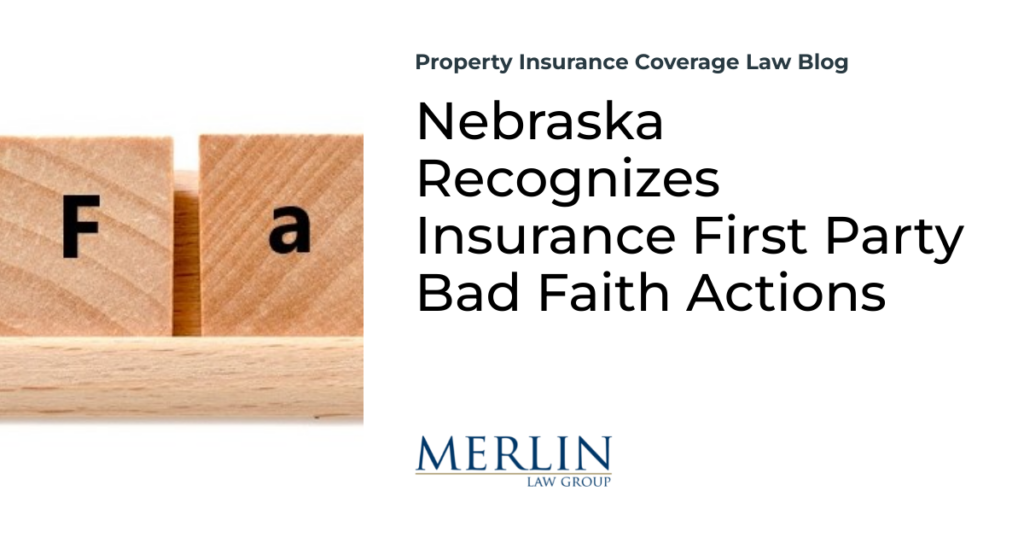Nebraska Recognizes Insurance First Party Bad Faith Actions

An insurance class action case in Nebraska recently discussed obligations of good faith and fair dealing.1 Nebraska recognizes that the breach of the covenant of good faith and fair dealing is actionable and provides policyholders with extracontractual remedies.
The court noted Nebraska general law regarding good faith arising in the first-party context:
Nebraska law recognizes that ‘[a]n insurance policy is a contract.’ Lynch v. State Farm Mut. Auto. Ins. Co., 745 N.W.2d 291, 296 (Neb. 2008). ‘The implied covenant of good faith and fair dealing exists in every contract and requires that none of the parties do anything which will injure the right of another party to receive the benefit of the contract.’ Dietzel Enterprises, Inc. v. J. A. Wever Constr., L.L.C., 979 N.W.2d 517, 527 (Neb. 2022). While ‘there must have been a contract at some point in time in order for there to be a bad faith claim,’ Hayes v. Metro. Prop. & Cas. Ins. Co., 908 F.3d 370, 374 (8th Cir. 2018) (applying Nebraska law), ‘a cause of action for insurer bad faith is separate from, and not dependent on, a cause of action for breach of the insurance policy, although the two may share facts in common.’ Millard Gutter Co. v. Shelter Mut. Ins. Co., 980 N.W.2d 420, 432 (Neb. 2022). Indeed, Nebraska Recognizes ‘claims of bad faith are grounded in tort’ and ‘it is the breach of the covenant of good faith and fair dealing from which the insurer’s tort liability springs.’…
‘The nature and extent of an implied covenant of good faith and fair dealing are measured in a particular contract by the justifiable expectations of the parties. Where one party acts arbitrarily, capriciously, or unreasonably, that conduct exceeds the justifiable expectations of the second party.’ …’A violation of the covenant of good faith and fair dealing occurs only when a party violates, nullifies, or significantly impairs any benefit of the contract.’ Spanish Oaks, Inc. v. Hy-Vee, Inc., 655 N.W.2d 390, 400 (Neb. 2003). This implied covenant is not ‘an everflowing cornucopia of wished-for legal duties’ and ‘cannot give rise to new obligations not otherwise contained in a contract’s express terms.’ Dick v. Koski Pro. Grp, P.C., 950 N.W.2d 321, 360 (Neb. 2020)… Whether a party acted in good faith in the performance of a contract ‘is a question of Fact’ under Nebraska law.
We discussed the Nebraska bad faith pleading requirements in a case Merlin Law Group attorney Javier Delgado litigated in Nebraska Bad Faith Pleading and Requirements. Generally, the facts must show “the absence of a reasonable
basis for denying benefits of the insurance policy and the defendant’s knowledge or reckless disregard of the lack of a reasonable basis for denying the claim[.]” The federal court noted these requirements stating:
For example, in Ruwe, the ‘principal allegation of bad faith [was] that [the insurance company] denied [the plaintiff’s] claim without a proper and thorough investigation of the fire scene and falsely accused [the plaintiff] of arson without a reasonable basis.’ The lower court initially dismissed the plaintiff’s claim in Ruwe for failing to state a cause of action, but the Nebraska Supreme Court reversed…In so doing, the Nebraska Supreme Court explained that ‘[t]o show a claim for bad faith, a plaintiff must show the absence of a reasonable basis for denying benefits of the insurance policy and the defendant’s knowledge or reckless disregard of the lack of a reasonable basis for denying the claim[.]’… The Ruwe court further explained that the ‘knowledge or reckless disregard element’ can be shown ‘by an insurer’s failure to conduct a proper investigation and subject the results to a reasonable evaluation and review.’
The bottom line is that Nebraska recognizes insurance first-party bad faith actions at common law, and those actions can be brought only by policyholders.
Thought For The Day
The principle of acting in good faith is at the heart of decent work.
—Richard Eyre
1 Stromquist v. Progressive Universal Ins. Co., No 8:22-cv-00332 (D. Neb. Mar, 16, 2023).







